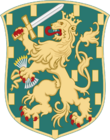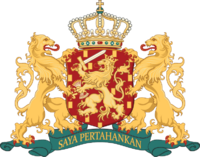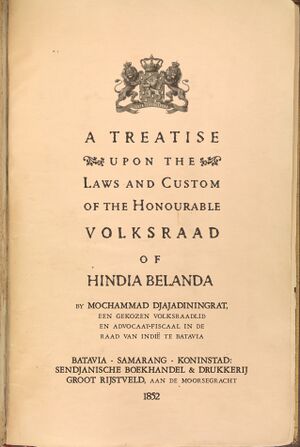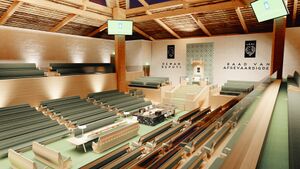Parliament of Hindia Belanda
This article is incomplete because it is pending further input from participants, or it is a work-in-progress by one author. Please comment on this article's talk page to share your input, comments and questions. Note: To contribute to this article, you may need to seek help from the author(s) of this page. |
Parliament of Hindia Belanda Parlemen Hindia Belanda Staten-Generaal van Nederlands Indië | |
|---|---|
| 18th Parliament | |
 | |
| Type | |
| Type | |
| Houses | Dewan Deputi Dewan Bangsawan |
| Leadership | |
Governor-General | |
Masagos Yacob Mohamad, Independent | |
Fatima Najib, Independent | |
Government leader | The Rt. Hon. Antje Moeljani, National Indies Party |
Leader of the Opposition | The Rt. Hon. Marcus Overstraten, Liberal Democratic Party (Hindia Belanda) |
| Structure | |
 | |
Dewan Deputi political groups | National Indies Party: 267 seats Aliansi Merdeka: 12 seats Liberal Democratic Party: 220 seats Independent: 18 seats Social Democratic Workers' Party: 15 seats Orange Banner League: 8 seats
|
 | |
Dewan Bangsawan political groups | National Indies Party: 202 seats Aliansi Merdeka: 10 seats Liberal Democratic Party: 153 seats Independent: 33 seats Djokdjakarta (princely): 1 seat Soerakarta (princely): 1 seat Pakoealam (princely): 1 seat Alkadrie (princely): 1 seat Boeleleng (princely): 1 seat Soekadana (princely): 1 seat Koetei (princely): 1 seat Riouw (princely): 1 seat Siak (princely): 1 seat Pasir (princely): 1 seat Ternate (princely): 1 seat Tidore (princely): 1 seat Kucing Rubuh (princely): 1 seat Tanau (princely): 1 seat Mangkoenegara (princely): 1 seat
|
Joint committees | Parliamentary Joint Committee on National Security All-party Joint Committee on Viceregal Appointments |
| Elections | |
| First past the post | |
| Meeting place | |
 | |
| Palace of the Staten-Generaal, Groot Rijstveld, Jakarta | |
| Website | |
| parlemen | |
The Parliament of Hindia Belanda (Indonesian: Parlemen Hindia Belanda, Dutch: Staten-Generaal van Nederlands Indië) is the bicameral legislative body of the Commonwealth of Hindia Belanda, consisting of the Dewan Bangsawan (upper house) and the Dewan Deputi (lower house). As a parliamentary democracy, Hindia Belanda follows the doctrine of parliamentary sovereignty which dictates that the Staten-Generaal holds absolute supremacy over all political bodies within the Commonwealth. The parliament meets at the Palace of the Staten-Generaal in Groot Rijstveld, Jakarta.
The Staten-Generaal of Hindia Belanda is the direct successor of the Volksraad and the Raad van Indië, after the two were dissolved in 1929 when the colony achieved independence and the Commonwealth in its current form was first established.
The Raad van Indië, being the former advisory council of the Governor-General in the colonial era, was transformed into the current Dewan Bangsawan consisting of appointed life peers and princely peers at the independence of Hindia Belanda in 1929. The Governor-General appoints life peers who are drawn from a variety of backgrounds on the advice of the all-party Peerage Commission. On average, three life peers are created every year, which in December 2018 total 398. These life peers include distinguished former MPs, academics, artists, trade unionists, public servants and retired ambassadors. The Governor-General also summons princely peers who each represent a single princely house. Under an agreement reached between the newly independent Hindia Belandan state and the 15 princely states, each head of a princely house may appoint one member of their family to sit in the Dewan Bangsawan. The 15 princely peers who sit in Parliament may participate in voting for all except money bills that are laid before the Dewan Bangsawan.
The Dewan Deputi, the lower house, is the direct successor of the Volksraad, the colonial legislature which existed from 1852 until the independence of Hindia Belanda when it transformed into the current lower house with its own standing orders and rules. It comprises 540 members of parliament (MPs or, formally, Deputies) who are elected to represent their constituencies. Anyone may stand for election to the Dewan Deputi if he or she is a Hindia Belandan citizen, aged 18 or older, enrolled in the Commonwealth Great Roll of Electors as an elector and is "of sane mind", as required by the Elections to the Dewan Deputi Act 1929. Conditions which disqualify a citizen from standing for election to the Dewan Deputi include being a sitting member of the Dewan Bangsawan or a provincial legislature, being heir apparent to a Hindia Belandan princely throne, and or serving in a position of profit under the Crown (i.e being appointed wedana of a ceremonial district). The last condition plays an important role in the resignation of MPs.
History
Precursor
Colonial legislature
The present-day Hindia Belandan Parliament has its origins in the colonial era with the creation of the Volksraad, which first met in 1852. The creation of the Volksraad was provided for by law in 1850, adding a new chapter to the already extensive Reglement op het beleid der Regering van Nederlands Indië which regulated the conduct of the colonial administration in Hindia Belanda and effectively ceased financial contributions by the colony to Noordenstaat, its mother country. The Volksraad was initially established as a unicameral legislature limited only to legislating matters of finance, inland administration, education and welfare but it might lay before the Sovereign and the Noordenstaater Parliament any matter it pleases (which it had done numerous times to achieve substantial changes to the way the colony functioned). There were 40 members, 25 of whom elected and the rest appointed by the Governor-General at the recommendation of the Raad van Indië. Of the 25 elected members, 5 were Noordenstaater-born Lorecians (totok), 16 were native Javanese, 2 Chinese and 2 Arabs. Of the 15 appointed members, 10 were natives from islands outside Java such as Bali, Borneo, Celebes, Senjani, Somatra and Timor, and the rest were representatives of influential parties and organisations at the time, such as the pro-Home rule Insulinde Party, the Muslim batik traders' union Sarekat Islam and the pro-conscription interest group Indië Weerbaar.
The electorate of the Volksraad consisted of land-owning natives of both sexes (land ownership in the colony was a right exclusively accorded to native Hindia Belandans), property-owning Noordenstaater men with a net-worth of 500 Guilders or more, Chinese merchants with a business registered to a trade guild and, lastly, public servants of Arabic descent who hailed from Riysa.
The Volksraad in its formative years exerted pressure upon the colonial government and was overall a formidable critic of colonial policy with the admission of pro-Home rule members. A further change in the law in 1867 removed from the Raad van Indië significant influence and executive powers which it previously held, effectively reducing it into a purely-advisory body. The change also accorded new legislative powers to the Volksraad and produced a new staatsinrichting giving greater autonomy to the colony, which ultimately catalysed the independence movement.
In 1919, the Volksraad exercised its right to lay matters before the Noordenstaater Parliament by petitioning it for an end to the Noordenstaater Parliament's legislating powers over the colony of Hindia Belanda. The Noordenstaater Parliament rejected this petition, known as the Soetardjo petition, on the grounds that it believed the colony was not yet ready for home rule. The rejection was negatively received by the population, who now had begun lending their support to the independence movement, which was principally led by the National Indies Party. In the wake of that rejection, Republicanism, a movement led by Soekarna who would go on to become the first Prime Minister of independent Hindia Belanda, came into existence and had started to gain grounds on islands outside Java.
The obstinacy of the Noordenstaater Parliament to grant the colony Home Rule led to the dramatic shifting of support of pro-Noordenstaater Volksraad members to the independence movement, which was now gaining popularity throughout the colony. By 1925, the Volksraad chamber was dominated by pro-independence members with a significant minority supporting a republican form of government. The Volksraad in 1927 famously passed a resolution which included an ultimatum that should the Noordenstaater Parliament continue to refuse granting home rule, the Volksraad would provide official support for the independence movement. By now, the colonial Governor-General was losing his influence over the colony and many generals in the Koninklijke Nederlands Indische Leger were lending their support for Hindia Belandan independence. Ideas of independence of Hindia Belanda quickly reached some Noordenstaater politicians sympathetic to the struggles of the Hindia Belandan people.
End of colonial Hindia Belanda
The fate of the colony was sealed in 1928 when the Noordenstaater Parliament rejected the petition for the third time. In February 1928, Soetardjo Kartadiningrat, an elected member of the Volksraad after whom the Soetardjo Petition was named, begged to move that the Volksraad support Hindia Belandan independence. The motion was passed near unanimously.
Composition
 |
|---|
| This article is part of a series on the politics and government of Hindia Belanda |
The Parliament of Hindia Belanda is composed of the Governor-General, the Dewan Bangsawan and the Dewan Deputi, each complementing one another in the legislative process with their distinct roles. This model was inherited from its precursor bodies in the colonial era.
Members of the Dewan Deputi are known as members of parliament, or officially but less commonly as Deputies. Members of the Dewan Bangsawan are known as peers, of which there are two types: life peers and princely peers. Peers are far less politically powerful than members of parliament, but they are placed above the latter in the Commonwealth Order of Precedence.
Procedure

A set of procedures regulates proceedings of both houses of parliament and it is drawn from multiple sources, the most important being Mochammad Djajadiningrat's Treatise upon the Laws and Custom of the Honourable Volksraad which is the parliamentary authority currently in use written by a member of the colonial Volksraad and the Raad van Indië. Other sources of Hindia Belandan parliamentary procedure include the standing orders of each house and, in the case of the Dewan Deputi, rulings from the chair which are sought for situations not covered by the rules and the parliamentary authority. Rulings from the chair may set precedents for similar situations in the future.
Presiding officers
Each house of the Hindia Belandan Parliament elects a speaker to preside over the chamber. For the Dewan Deputi, MPs elect a member from their own ranks. For the Dewan Bangsawan, life and princely peers elect a life peer who is unaffiliated with any political party in the chamber.
Divisions of parliamentary time
A parliament is the period between one general election and the next general election. A parliament is normally consisted of 5 sessions, for a total of 5 years. In extraordinary circumstances, such as during a war, a parliament may last for as long as necessary. A session is the period between the Throne Speech and prorogation at the end of a session or dissolution if it is the last session of that parliament. A session normally commences in June and ends in May the next year.
Commencement of a parliament
Following a general election, a new parliament assembles on the day specified in the writ of election as issued by the Governor-General for that specific general election. On that day, the clerks of each house read a proclamation from the Governor-General explaining the causes of the calling of a new parliament. The causes are always read in the manner as follows:
A Proclamation under the Great Seal of the Commonwealth. [name of incumbent Governor-General], Governor-General and Commander-in-Chief of the Commonwealth of Hindia Belanda.
To all to whom these Presents shall come, We greet you well:
Whereas Our Staten-Generaal of Hindia Belanda was dissolved on [last dissolution date], We therefore appoint [Date and time] as the day and time for Members of the Dewan Deputi newly elected to meet at Our city of Jakarta, then and there to have conference with the peers of the Dewan Bangsawan so that they may have power for themselves to act, treat, consent unto and do those things which shall be ordained for the maintenance of independence, safety and happiness of this Commonwealth; so that, by reason of improvident choice, the said affairs may not be left undone in any wise so as to condemn this Commonwealth to grave peril.
After the causes of the calling of parliament are read, newly elected MPs (members of the Dewan Deputi) go to the chamber of the Dewan Bangsawan where they are commanded by Viceregal Commissioners who sit on a bench placed one step below the dais of the Viceregal Throne to elect a Speaker of the Dewan Deputi. MPs return to their chamber and thus elect a Speaker from their own ranks. After having elected a new Speaker, MPs return to the chamber of the Dewan Bangsawan where the Speaker-elect delivers a formulaic speech to the Viceregal Commissioners:
May it please Your Excellencies: the Dewan Deputi has elected me their Speaker. If in the performance of my duties I should at any time fall into error, I pray that the fault may be imputed to me and not to the Deputies, whom I serve, that they may have freedom of speech in their discourse to serve their undoubted Sovereign Lady Queen Anne-Charlotte and their country.
The Viceregal Commissioners then deliver the Governor-General's approbation of the newly-elected Speaker after which MPs return to their chamber to take the oath of allegiance or make the solemn affirmation. The Speaker-elect is normally the first to take the oath of allegiance or make the solemn affirmation, followed by the longest-serving MP, the Prime Minister, the Leader of the Opposition, cabinet ministers, shadow cabinet ministers and thereafter MPs of the other opposition parties.
MPs queue up alongside the Table of the Dewan Deputi, a black nero marble slab quarried from Borneo on which the Mace, despatch boxes and sacred texts are placed, to take turns taking the oath or making the affirmation. The Primary Clerk of the Dewan Deputi administers the oath and directs MPs, having taken the oath or made the solemn affirmation, to sign their names onto the Roll of Deputies, a parchment book. Afterwards, MPs are introduced individually to the Speaker of the Dewan Deputi by the Assistant Clerk.
The wording of the oath was established in the Commonwealth Parliament Act 1929, an act of the Volksraad which came into force on the last day of colonial Hindia Belanda and adopted verbatim by the new Hindia Belandan Parliament the next day. An MP, holding a sacred text of their choosing, takes the oath by saying the following words:
I, [name of the MP], swear before Almighty God that I will be faithful and bear true allegiance to Her Majesty Queen Anne-Charlotte and her successors according to the law of succession to the Hindia Belandan throne; that I will maintain the independence of the Commonwealth of Hindia Belanda and shall devote my service to the people of this nation. So help me God
MPs may make the solemn affirmation in lieu of the oath by saying the words:
I, [name of the MP], do solemnly, sincerely, and truly declare and affirm that I will be faithful and bear true allegiance to Her Majesty Queen Anne-Charlotte and her successors according to the law of succession to the Hindia Belandan throne; that I will maintain the independence of the Commonwealth of Hindia Belanda and shall devote my service to the people of this nation.
MPs take the oath or make the affirmation on the first five days of a new parliament. Similarly, members of the Dewan Bangsawan also sit for five days for taking the same oath and making the same affirmation. In the evening of the fifth day of the 'swearing-in period', both houses of parliament adjourn to the day the Governor-General delivers the Throne Speech, usually two to three days after.
Opening of Parliament
Main article: Opening of Parliament (Hindia Belanda)
Every session begins with the opening of parliament, an elaborate display of ceremony and pageantry which takes place at the Palace of the Staten-Generaal in Jakarta.

